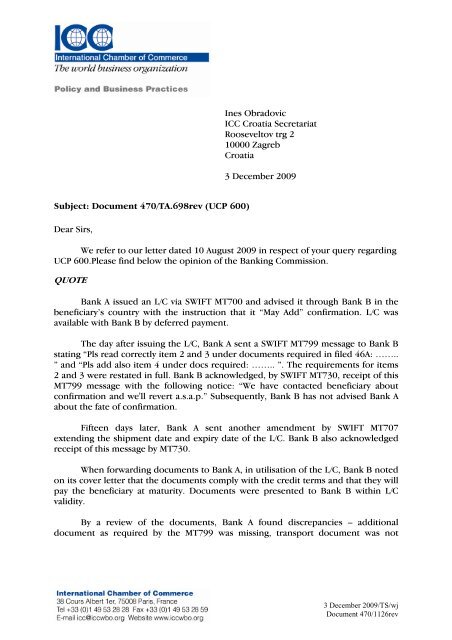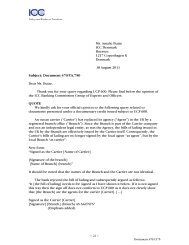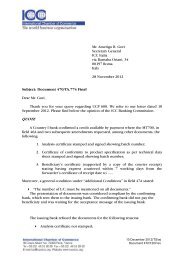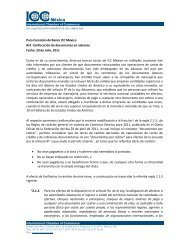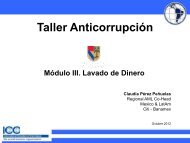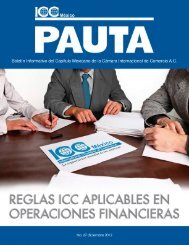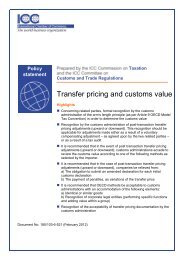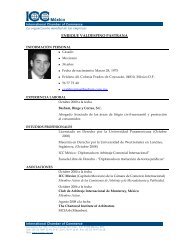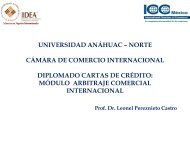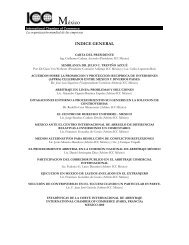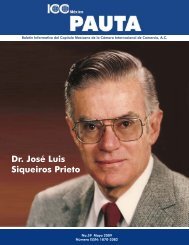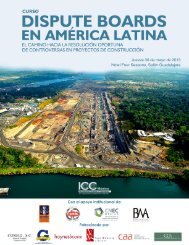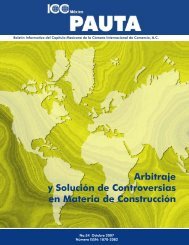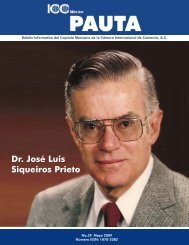1126rev November 2009 Consolidated Final Opinions
1126rev November 2009 Consolidated Final Opinions
1126rev November 2009 Consolidated Final Opinions
Create successful ePaper yourself
Turn your PDF publications into a flip-book with our unique Google optimized e-Paper software.
Subject: Document 470/TA.698rev (UCP 600)<br />
Dear Sirs,<br />
Ines Obradovic<br />
ICC Croatia Secretariat<br />
Rooseveltov trg 2<br />
10000 Zagreb<br />
Croatia<br />
3 December <strong>2009</strong><br />
We refer to our letter dated 10 August <strong>2009</strong> in respect of your query regarding<br />
UCP 600.Please find below the opinion of the Banking Commission.<br />
QUOTE<br />
Bank A issued an L/C via SWIFT MT700 and advised it through Bank B in the<br />
beneficiary’s country with the instruction that it “May Add” confirmation. L/C was<br />
available with Bank B by deferred payment.<br />
The day after issuing the L/C, Bank A sent a SWIFT MT799 message to Bank B<br />
stating “Pls read correctly item 2 and 3 under documents required in filed 46A: ……..<br />
” and “Pls add also item 4 under docs required: …….. ”. The requirements for items<br />
2 and 3 were restated in full. Bank B acknowledged, by SWIFT MT730, receipt of this<br />
MT799 message with the following notice: “We have contacted beneficiary about<br />
confirmation and we'll revert a.s.a.p.” Subsequently, Bank B has not advised Bank A<br />
about the fate of confirmation.<br />
Fifteen days later, Bank A sent another amendment by SWIFT MT707<br />
extending the shipment date and expiry date of the L/C. Bank B also acknowledged<br />
receipt of this message by MT730.<br />
When forwarding documents to Bank A, in utilisation of the L/C, Bank B noted<br />
on its cover letter that the documents comply with the credit terms and that they will<br />
pay the beneficiary at maturity. Documents were presented to Bank B within L/C<br />
validity.<br />
By a review of the documents, Bank A found discrepancies – additional<br />
document as required by the MT799 was missing, transport document was not<br />
3 December <strong>2009</strong>/TS/wj<br />
Document 470/<strong>1126rev</strong>
marked as required in the MT799, taking over protocol showed delivery term FCA<br />
instead of EXW named place as it was required in original MT700.<br />
Bank A sent an advice of refusal by SWIFT MT734 referring to sub-article 16 (c)<br />
(iii) (b) of UCP 600, stating discrepancies which all except one related to the<br />
amendment sent by MT 799.<br />
After L/C expiration, Bank A contacted Bank B to forward documents required<br />
by MT799 in order for applicant to resolve customs formalities and clearing of the<br />
goods. Bank B forwarded one of the required documents one month later.<br />
After receipt of documents, and having not received a waiver from the<br />
applicant in a reasonable time, Bank A returned the documents to Bank B.<br />
Bank B contested, for the first time, Bank A’s advice of refusal which was sent<br />
two months earlier, on the grounds that Bank`s A MT799 cannot be considered as an<br />
amendment and that it was not accepted by the beneficiary. Therefore, in Bank B’s<br />
opinion the presented documents should have been examined against the terms and<br />
conditions stated in the MT700 and the amendment sent by MT707, and that they<br />
should be considered as a compliant presentation against which Bank A should pay.<br />
NATIONAL COMMITTEE ANALYSIS<br />
1. Could the MT799 be construed to be an amendment message?<br />
Sub-article 11 (a) of UCP 600 states “An authenticated teletransmission of a<br />
credit or amendment will be deemed to be the operative credit or amendment, and<br />
any subsequent mail confirmation shall be disregarded.”<br />
2. Could Bank B, being the nominated bank under the L/C, and asked by Bank A to<br />
add its confirmation, be considered a confirming bank as it failed to advise Bank<br />
A that it was not prepared to add its confirmation as required by sub-article 8 (d)<br />
of UCP 600? Bank B, on its covering letter accompanying the documents, states<br />
that it will pay beneficiary at maturity date thus expressing its undertaking<br />
towards the beneficiary.<br />
Sub-article 8 (d) of UCP 600 states “If a bank is authorized or requested by the<br />
issuing bank to confirm a credit but is not prepared to do so, it must inform the<br />
issuing bank without delay and may advise the credit without confirmation.”<br />
3. Was Bank B, at the moment of forwarding documents to Bank A, obliged to<br />
advise Bank A of the amendments which have been rejected by the beneficiary?<br />
– 39 –<br />
Document 470/<strong>1126rev</strong>
Also, in accordance with which terms and conditions it has performed the<br />
examination of documents, especially having in mind that there were more than<br />
one amendment under the L/C?<br />
Sub-article 10 (c) of UCP 600 states ''The terms and conditions of the original<br />
credit (or a credit incorporating previously accepted amendments) will remain in<br />
force for the beneficiary until the beneficiary communicates its acceptance of the<br />
amendment to the bank that advised such amendment, The beneficiary should<br />
give notification of acceptance or rejection of an amendment. If the beneficiary fails<br />
to give such notification, a presentation that complies with the credit and to any not<br />
yet accepted amendment will be deemed to be notification of acceptance by the<br />
beneficiary of such amendment. As of that moment the credit will be amended.''<br />
Sub-article 10 (d) of UCP 600 states ''A bank that advises an amendment<br />
should inform the bank from which it received the amendment of any notification of<br />
acceptance or rejection.''<br />
NATIONAL COMMITTEE CONCLUSION<br />
An MT799 is an authenticated teletransmission and as such it is to be<br />
considered as an operative instrument. Therefore, Bank B must act upon receipt of<br />
the amendment sent by MT799 and advise it to the beneficiary.<br />
Bank B, being a nominated bank and asked by Bank A to add its confirmation<br />
to the L/C, may be considered as confirming bank as it has advised Bank A that it had<br />
contacted beneficiary for confirmation (and thus expressed its willingness to do so, if<br />
the beneficiary asked for it) and has never advised Bank A of its refusal to add<br />
confirmation. Moreover, it has advised Bank A on its covering letter, accompanying<br />
the documents, that it will pay the beneficiary at maturity i.e. that it has undertaken<br />
an obligation towards the beneficiary.<br />
As confirming bank, Bank B was obliged to advise Bank A from which it has<br />
received amendments which amendments have not been accepted by the beneficiary<br />
and also amendments, if any, to which it has not extended its confirmation (subarticle<br />
10 (b) of UCP 600) thus providing information both to the issuing bank and to<br />
the beneficiary as to what terms and conditions will be relevant for checking of<br />
documents in order to ascertain whether the presentation is compliant or not.<br />
Although a confirming and issuing bank must, on the grounds of the documents<br />
alone, conclude whether documents represent a complying presentation, the<br />
confirming bank being in direct contact with the beneficiary and also being<br />
responsible for checking of documents should advise the issuing bank what are the<br />
valid terms and conditions for checking i.e., which amendments have not been<br />
– 40 –<br />
Document 470/<strong>1126rev</strong>
accepted by the beneficiary, just to be sure that they are on the same page when<br />
checking of documents is performed.<br />
Following the aforesaid, Bank A’s refusal of documents was justified since<br />
Bank B has not acted in accordance with generally accepted rules and practices for<br />
handling of L/Cs, as stated in UCP 600 and, last but not least, all discrepancies stated<br />
by Bank A were not all related to the amendment sent by MT799.<br />
ANALYSIS & CONCLUSION<br />
1. The conclusion of the national committee is supported subject to the following.<br />
Sub-article 7 (b) states “[A]n issuing bank is irrevocably bound to honour as of<br />
the time it issues the credit.” The wording of the MT799 provided the new<br />
wording for documents 2 and 3 plus details of a document not appearing in the<br />
MT700. Based on the wording of the message, it would indicate an amendment to<br />
the original LC terms, that was subject to the consent of the beneficiary and was<br />
to have been advised to the beneficiary in accordance with sub-article 9 (b).<br />
Bank A is obliged to honour a presentation of documents that complies with the<br />
terms and conditions of the original credit; the original credit and MT799; the<br />
original credit, MT799 and MT707; or the original credit, MT707 but not the<br />
MT799. See point 3, regarding acceptance or rejection of the amendments.<br />
Where bank systems permit, they should use the correct SWIFT message type for<br />
the transaction and not the MT799.<br />
2. The conclusion of the national committee is not supported.<br />
The instruction to Bank B, in relation to confirmation, was “May Add”. Such an<br />
instruction allows Bank B to add their confirmation upon a request from the<br />
beneficiary. Such a request need not be forthcoming at the time of advising the<br />
credit and may occur at any time. Sub-article 8 (d) would only be applicable if<br />
Bank B were not willing to consider any request to add confirmation. If they were<br />
awaiting a request from the beneficiary, there is no need for them to advise the<br />
issuing bank of this fact. The credit would have been advised on an unconfirmed<br />
basis pending receipt of a request for confirmation from the beneficiary.<br />
Whether or not Bank B entered into an express communication with the<br />
beneficiary, in accordance with sub-article 12 (a), is of no concern to Bank A and<br />
does not affect the confirmation status of the credit.<br />
– 41 –<br />
Document 470/<strong>1126rev</strong>
3. The conclusion of the national committee is not supported.<br />
Bank B was under no obligation to inform Bank A of the amendments that had<br />
been accepted or rejected by the beneficiary. In these situations it would be Bank<br />
A that would need to make their own determination from the documents<br />
presented, in accordance with sub-article 10 (c), absent any specific indication of<br />
acceptance or rejection from the beneficiary and/or Bank B. It is unclear as to<br />
whether Bank B received a notification of acceptance or rejection of the<br />
amendments from the beneficiary. Only if they had, would they be required to<br />
send a notification in accordance with sub-article 10 (d).<br />
The opinion(s) rendered on this query reflect the opinion of the ICC<br />
Banking Commission based on the facts under “QUOTE” above.<br />
The reply given is not to be construed as being other than solely for the<br />
benefit of guidance and there should be no legal imputation associated with<br />
the reply offered.<br />
If this query relates to a matter currently under consideration by the<br />
courts, the ICC Banking Commission will refrain from considering it for<br />
adoption as an opinion.<br />
Neither the ICC nor any of its employees, nor any member of the<br />
Banking Commission, including the Chairman, Vice-Chairmen or Technical<br />
Adviser shall be liable to any person for any loss or damage arising out of any<br />
act or omission in connection with the rendered opinion(s).<br />
Yours sincerely,<br />
Thierry Senechal<br />
Policy Manager<br />
Banking Commission<br />
– 42 –<br />
Document 470/<strong>1126rev</strong>


